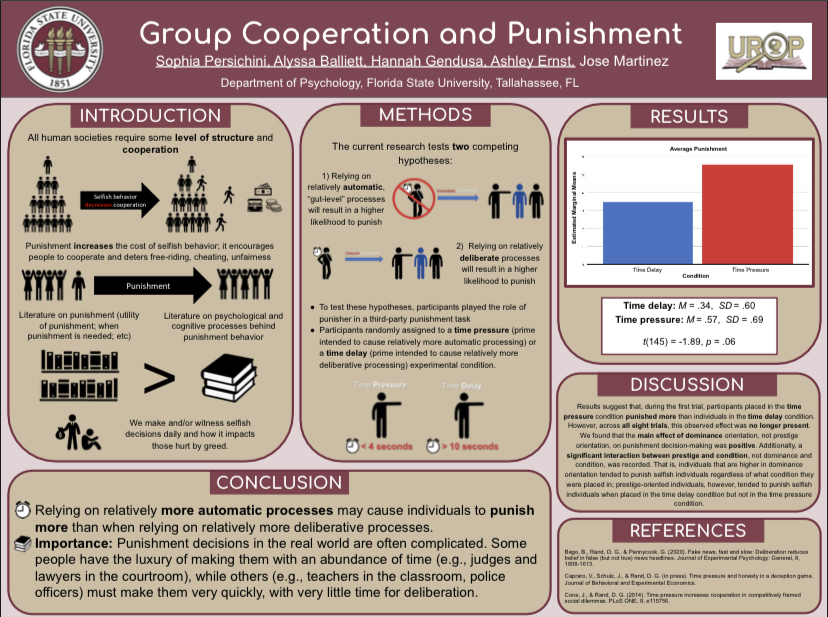Research Symposium
23rd annual Undergraduate Research Symposium, April 6, 2023
Sophia Persichini Poster Session 1: 11:00 am - 12:00 pm/ Poster #52

BIO
Sophia Persichini is a Political Science major from Washington state planning on attending law school after her time at Florida State University. She is engaged on campus by being involved in psychology research as an assistant and holding the position as merchandise chair in the FSU Chapter of Phi Alpha Delta Pre-Law Fraternity.
Group Cooperation and Punishment
Authors: Sophia Persichini, Jose MartinezStudent Major: Political Science
Mentor: Jose Martinez
Mentor's Department: Psychology Mentor's College: Florida State University Co-Presenters: Hannah Gendusa, Alyssa Balliett, and Ashley Ernst
Abstract
Punishment is useful for increasing group cooperation and reducing selfish behavior. However, many questions remain regarding the psychological and cognitive processes that drive punishing behavior. The current research tests two competing hypotheses regarding the processes behind punishment: (1) punishment relies on relatively automatic processes (2) punishment relies on relatively deliberate processes. To test these hypotheses, participants played the role of “punisher” and were placed in either a time pressure (prime intended to cause relatively automatic processing) or a time delay (prime intended to cause relatively deliberative processing) experimental condition. Results suggest that, during the first trial, participants in the time pressure condition punished more than individuals in the time delay condition. However, across all eight trials, this observed effect was no longer present. Secondary analyse examined the potentially moderating roles of individual differences in dominance and prestige. We found that the main effect of dominance orientation, not prestige orientation, on punishment decision-making was positive. Additionally, a significant interaction between prestige and condition, not dominance and condition, was recorded. These findings suggest that, when individuals are provided time to deliberate, the decision to punish may not be chosen, allowing the uncooperative behavior exhibited by a selfish individual to go unaddressed. While dominance-orientated individuals appear to punish a selfish individual regardless of the time allotted, prestige-orientated individuals may only make such a decision after deliberation. While punishment can be a costly behavior, it is a necessary decision as there may be circumstances that disincentivize individuals from punishment decision-making that must be addressed.
Keywords: Group Cooperation, Punishment, Decision-making in Groups

